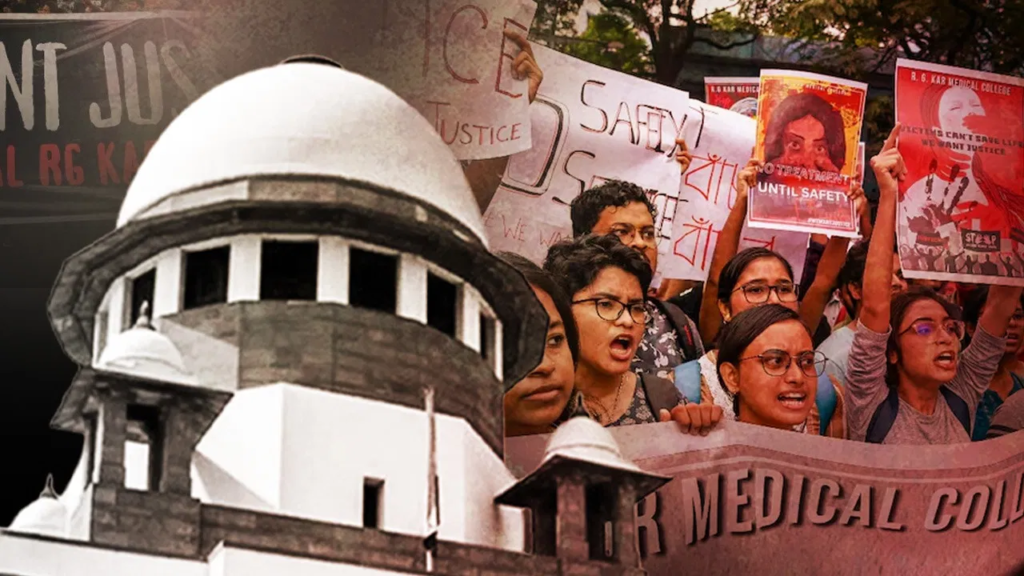Rehan Khan
On 22nd August, the Supreme Court made an emphatic appeal to political parties and the government to refrain from politicizing the tragic rape and murder of a resident doctor at RG Kar Medical College and Hospital in Kolkata on August 9th. The Court, which took suo motu cognizance of the incident, expressed deep concern over the safety and welfare of doctors, underscoring the need for enforceable measures rather than mere guidelines to protect medical professionals.
A Bench comprising Chief Justice of India (CJI) DY Chandrachud and Justices JB Pardiwala and Manoj Misra presided over the matter. The hearing saw heated exchanges between the Central Bureau of Investigation (CBI) and the State of West Bengal, with both parties trading accusations fueled by statements made by leaders from the Bharatiya Janata Party (BJP) and Trinamool Congress (TMC). Solicitor General (SG) Tushar Mehta, representing the CBI, highlighted a remark by a state Minister threatening that “fingers pointing towards Mamata Banerjee will be chopped off.” In response, Senior Advocate Kapil Sibal, appearing for the West Bengal government, cited a comment by the leader of the opposition, Suvendu Adhikari, who had said, “bullets will be fired.” The Court firmly advised all parties to refrain from politicizing the case, stating, “Do not politicize the situation. Law will take its course.”
The Supreme Court emphasized its primary concern for the safety and welfare of doctors, ordering that no coercive action should be taken against medical professionals across India who participated in protests following the incident. The Bench urged doctors to resume their duties immediately to prevent any disruption in public health services. The Court assured the protesting doctors that no adverse action would be taken against them for participating in protests before the date of the order, stating, “No coercive action be taken against doctors after they come back to work after the date of today’s order.”
During the hearing, the Court also addressed the issue of ongoing protests by doctors from various institutions, including the All India Institute of Medical Sciences (AIIMS). The Delhi Medical Association informed the Court that First Information Reports (FIRs) had been filed against certain doctors from AIIMS who participated in the protests. The Court, expressing concern over the prolonged protests, remarked, “Justice and medicine cannot go on strike. Can we (judges) go and sit outside the Supreme Court now?” The Bench further added that while the doctors’ concerns were understandable, they must return to work for the greater good of the public, assuring them that no adverse actions would be taken if they resumed their duties.
The tragic incident at RG Kar Medical College, where the doctor was found dead in a seminar hall on August 9th, confirmed by autopsy to be a case of rape and murder, has sparked nationwide outrage. The case has prompted widespread protests among the medical community, demanding stricter laws and enhanced safety measures for healthcare professionals. The CBI took over the investigation after the Calcutta High Court transferred the probe to the central agency. The top court has also taken steps to establish a National Task Force (NTF) to examine the safety and dignity of doctors and medical professionals, particularly addressing issues related to gender-based violence and workplace safety.
In response to the Court’s previous directives, both the CBI and the State of West Bengal submitted status reports on the investigation’s progress. The CBI was asked to report on the ongoing investigation into the rape and murder case, while the State of West Bengal was instructed to provide updates on the acts of vandalism that occurred at the hospital premises following the crime. During the hearing, the Supreme Court expressed dissatisfaction with the delay in the demarcation of the crime scene, questioning the timeline provided by the State. The Bench scrutinized the timeline of events, particularly the registration of the Unnatural Death Case Report (UD report) and the subsequent post-mortem of the victim’s body. The Court found discrepancies in the timeline, with Justice JB Pardiwala questioning why the post-mortem was conducted before the UD report was registered, stating, “The procedure followed in criminal law by the police is not something CRPC follows or I have seen in my 30 years.”
Further, the conduct of the Assistant Superintendent of Police involved in the case was brought under scrutiny, with the Court expressing doubts about her actions during the investigation. The Bench also noted that the crime scene was tampered with before the CBI took over the probe, which the Solicitor General pointed out could have compromised the investigation.
The Supreme Court reaffirmed the importance of the National Task Force, assuring all stakeholders, including resident doctors, that their concerns would be addressed. The Bench emphasized that while not every medical association could be part of the Task Force, all relevant stakeholders would be consulted to ensure a comprehensive approach to improving the safety and working conditions of medical professionals. The Court also acknowledged the harsh working conditions faced by junior doctors, highlighting the need for reforms in public hospitals, where doctors are often forced to work long, gruelling hours.
Senior Advocate Geeta Luthra, representing junior resident doctors at RG Kar Medical College, informed the Court that her clients were being threatened by hospital administration members. This was corroborated by Senior Advocate Karuna Nundy, who stated that doctors in Kolkata were facing threats from “goons.” The Court took serious note of these allegations, asking for specific names to be provided so that the issue could be addressed appropriately.
Case title: In Re: Alleged Rape and Murder Incident of a Trainee Doctor in RG Kar Medical College and Hospital, Kolkata and Related Issues
Case no.: SMW(Crl) 02/2024)

